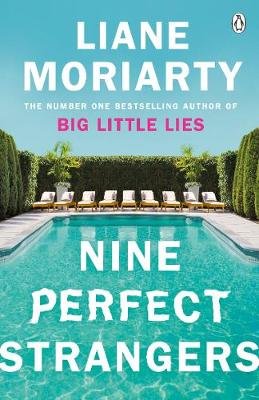
‘It was almost like she seriously didn’t care about the exhaust system.’
This is why I enjoy Lianne Moriarty’s books. The third person narration offers a frequently amusing and consistently insightful look into people’s inner thoughts and closest relationships, usually supported by a gradually tightening suspense story.
Having previously read and enjoyed several of Moriarty’s books, with the caveat that I sometimes found not all of the character arcs were sufficiently fully developed, I was keen to read ‘Nine Perfect Strangers’ and discover what could be so disturbing about spending ten days at a luxury health retreat.
What’s it about?
When nine people arrive to complete a ten day stay at a health retreat, they anticipate living under certain restrictions – no booze, smokes or snacks – but they haven’t anticipated exactly how the retreat director will ensure the experience is life changing…
It has been pointed out that the title is inaccurate (the retreat guests include a family of three and a married couple), but I am grateful for this inaccuracy! It’s tough enough keeping nine backstories in mind (there are twelve, actually, once the staff are included), so it’s helpful that five of the guests have existing connections. As is often the case in Moriarty’s stories, more than one character is hiding a guilty secret, so even the non-strangers feel estranged.
What’s it like?
A study of introspection spiced up with a tablespoon of melodramatic silliness. Initially I found the pace very slow, though Moriarty avoids the overwhelm I’ve experienced at the beginning of some of her previous books by making Frances Welty, a formerly successful romantic novelist, her main focus. After a rather odd standalone first chapter, chapters switch between Frances’ viewpoint and other perspectives until all the characters are sufficiently well established for us to switch back and forth among them all.
‘She couldn’t shake the feeling that if she didn’t record this moment on her phone, then it wasn’t really happening.’
Fortunately, frothy Frances remains a central voice throughout, injecting some necessary levity into a story predominantly peopled by characters in pain. Despite suffering from the triple indignity of a rejected book, a failed internet romance and a clearly psychosomatic (but still very painful) backache, Frances is our voice of reason and snark: ‘Why in the world would a young couple like that come to a health resort? Wasn’t this sort of place for the overweight and burnt-out, for those grappling with bad backs and pathetic mid-life identity crises?’
How interesting can ten days at a health retreat be?
Despite the restricted setting, Moriarty’s novel is well populated with recognisable people and experiences. I laughed aloud when young Zoe earnestly reassures Frances that she enjoyed reading her book, then instantly savages it in her mind when Moriarty switches to her perspective. Similarly, Frances’ mortification that the potential-serial-killer who witnessed her hot flush turns out to be a guest at the same retreat is swiftly followed by Tony’s flash of irritation that, ‘Loony woman was in the pool, bobbing about like a cork.’
Each character is struggling with some element of their personal life, from recent bereavement to divorce and body image. Young Jessica’s social media fixation (arguably more of an obsession than her forays into the world of cosmetic enhancement) is utterly convincing. Some reviewers have suggested Moriarty is unduly critical of Jessica and the world she inhabits, but while it’s true that she spends the starlight meditation contemplating what Instagram hashtags she would use to describe a photograph of her feet pointing towards the cosmos, Frances spends it sleeping. My take from the whole set-up was that Moriarty was having a gentle, good humoured dig at each character, not aiming to crucify Jessica’s generation and it’s obsessions.
‘It was written by a man Frances had met at a party last year. The man had been pleasant, shy and bespectacled, so Frances was trying to forgive him for his lavish description of beautiful corpses.’
The spa stay is simultaneously too dramatic and too slow. There’s a ridiculous, thiller-esque twist that the book just didn’t need, but the nature of the book meant that a lot of time was spent on exposition before any real action could occur. That said, I really enjoyed the epilogue. A lot happens and is dealt with very briskly, but there’s a wonderful send up of the romance genre (and a very odd swipe at book critics) and a fully convincing ending for each character. Endings can make or break a story and I feel that the slight unevenness of the preceding chapters can be forgiven in light of such a perfect ending.
Final thoughts
Perhaps my favourite element of the whole book is Frances’ experiences as a novelist. Her awkward conversations with her agent and publishers, the requirement for her to adjust a style that previously found great public favour in order to include greater suspense…one would be forgiven for wondering if Moriarty herself has been under pressure to adapt her plotting to better suit public tastes. There’s certainly more than a touch of meta-fiction happening when Moriarty writes of Frances that: ‘She’d tried to distract herself by reading in the hammock but her book had taken an outlandish turn which she couldn’t handle on an empty stomach.’ You have been warned!
‘Nine Perfect Strangers’,
Liane Moriarty,
2018, Penguin Books, paperback
Previously reviewed: ‘The Husband’s Secret‘, ‘What Alice Forgot‘, ‘Big Little Lies‘ and ‘Truly, Madly, Guilty‘.
1 Comment
I like the sound of this, and enjoyed Big Little Lies. Thanks for a great review 🙂